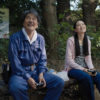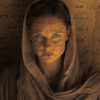Sofia Alaoui writes and directs Animalia. The film stars Oumaïma Barid, Mehdi Dehbi and Fouad Oughaou.
Itto is Odysseus, a motorised tricycle her galley, Khouribga her Ithaca.
Casablanca-born writer-director Sofia Alaoui crafts a near-Homeric lo-fi sci-fi in her debut feature, with exciting results. It tells the story of a heavily pregnant woman, Itto, who, following unexplained supernatural events, is forced to travel across Morocco to find her husband. Alaoui’s home country makes for a beautiful background to the film’s events as the main character traverses the stunning Moroccan landscapes. Animalia’s French-Moroccan origins are intrinsic to the film’s stories, as Alaoui weaves in an underlying tension of colonial legacy and class divide.
These class issues bubble under the surface throughout, exemplified in its use of language. Three languages are used in the film: French, Arabic, and one of the Berber languages spoken by the indigenous people of North Africa. Oumaïma Barid’s Itto switches between language depending on her situation: French when she’s with her husband’s upper-class family, Arabic in religious settings, and Berber when she interacts with people of apparently lower status. Class issues are layered in start to finish, and it’s this use of language that shows it most effectively.
Apostasy and religious doubt in the face of oncoming apocalypse is not a new idea in film – it’s even been shown earlier this year in M. Night Shyamalan’s Knock at the Cabin, and he had previously touched on this idea in Signs. What feels fresh, though, is a Muslim response to this idea: Shyamalan’s work is exemplative of the Judeo-Christian representation so ubiquitous in mainstream films that deal with faith, so to see it from the perspective of Islam is exciting. Islam is key to the film as a whole, too. Al-Ghaib is an important concept in Islam, referring in part to the ‘unseen’ realms of the divine – the Islamic world that Animalia inhabits allows for the cosmic aspects of the film’s science-fiction to effectively tie in with its religious questions.

It helps that the film looks gorgeous. Cinematographer Noé Bach indeed has rich natural backgrounds to work with and he makes the most of it, as he and Alaoui frame stunning shots start to finish. It looks great when it delves into its more supernatural segments too, with one hallucinatory (or revelatory) sequence in particular filled with beautiful visuals.
A little steam is lost in the third act, as the film seemingly struggles to reach a satisfying conclusion – certainly leaving more questions than answers. Its ambiguity works earlier on as Alaoui successfully builds suspense and tension, but, once the tension is more or less relieved in its closing minutes, it feels a little incomplete. This is ultimately no more than a minor complaint, as even in the third act there is plenty of tension for the most part.
Animalia is so named because of its recurring use of animals – birds, dogs, and sheep – to make tangible its supernatural divinity. Its original French title – Parmi nous – translates to Among Us, so it probably makes sense to change the name after the memeification of the video game of the same name. It’s already had wide release in France, and I hope it manages to find international success too.
If you’re into sci-fi, or films that tackle religious doubt or class divide, or, honestly, if you’re a film fan at all, you’ll find something to like in Animalia. Just don’t expect any clear-cut answers, and let yourself get swept up in the divine mystery of it all.








